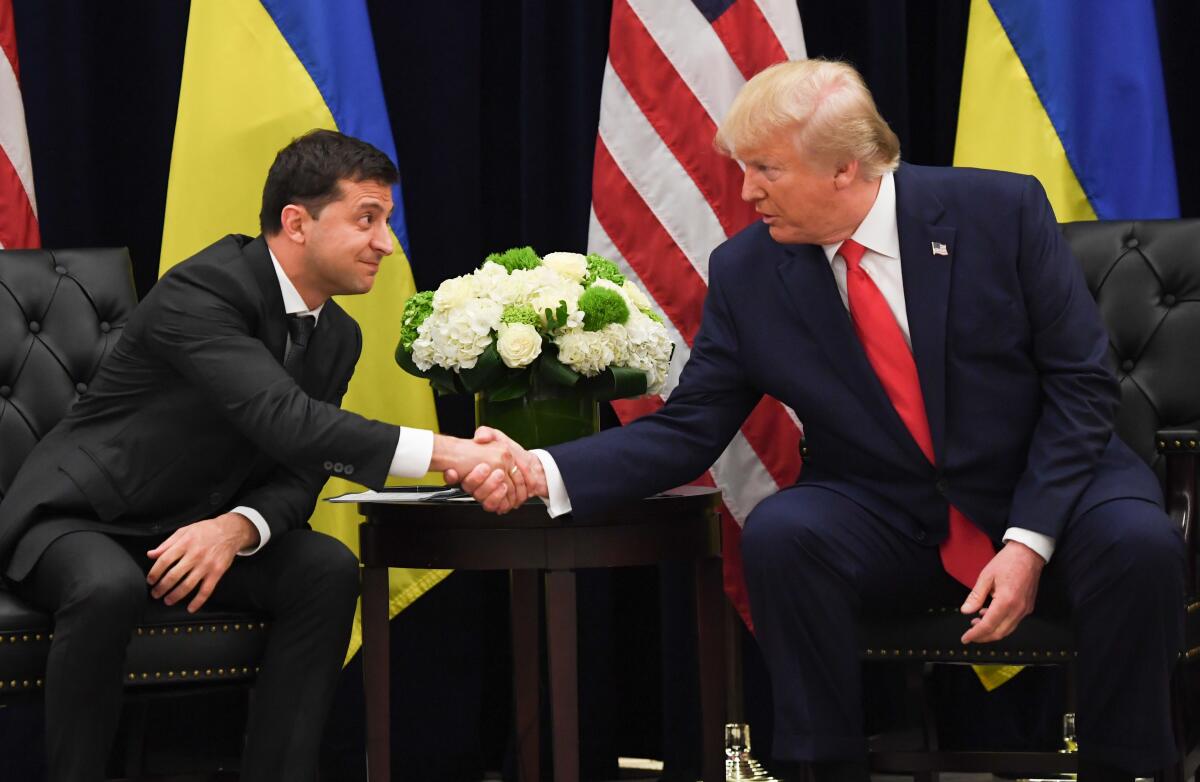Trump’s Ukraine call is helping Vladimir Putin spread his narrative of American corruption

- Share via
The reason President Trump’s July 25 call with Ukrainian President Volodymyr Zelensky is so profoundly dispiriting — apart from its potential violation of federal campaign law — is that it runs counter to the United States’ clear national interest: fighting corruption in Ukraine and ensuring the nation’s future as an independent liberal democracy.
When Trump withholds aid to a foreign country while asking its leader for what appears to be a personal political favor, he becomes an advocate of corruption, not its enemy. The president’s phone call has provided evidence for Russian President Vladimir Putin’s longtime contention that Americans are hypocrites, that we preach the rule of law but abandon it when it’s not in our interest.
I first went to Ukraine in the fall of 2014 for the Obama administration State Department. It was six months after Putin invaded and annexed Crimea, the southernmost part of Ukraine, and sent troops into eastern Ukraine as well. The U.S. had just started a sanctions regime against Russia for these violations of Ukrainian sovereignty. I was undersecretary of State for public diplomacy and we had noticed a disturbing uptick of Russian disinformation about Ukraine on Twitter and other social media platforms.
Russia’s aggressions followed months of massive protests in Kiev over its president, Viktor Yanukovych, canceling a trade alliance with the EU. The demonstrators’ “soft revolution” succeeded in ousting Yanukovych, who fled to Russia and into the arms of his patron, Putin. Yanukovych left behind records that showed he’d moved billions in state money into offshore accounts and businesses.
The U.S. wanted to keep Ukraine leaning west toward freedom; Putin’s goal was to undermine the Ukrainian revolution and stoke divisions and disunity. Russia’s military takeover in Crimea and eastern Ukraine was not meant to conquer the former Soviet republic but to create a “frozen conflict,” to render Ukraine a failed state, and to move it back into Russia’s orbit.
I had two assignments from the National Security Council: Help Ukraine’s information minister and its interim prime minister, Arseniy Yatsenyuk, combat the tsunami of Russian disinformation that was dividing Ukrainians, and urge them to address the rampant corruption that still existed in the Kiev government. The Ukrainians were besieged by Russian trolls accusing pro-democracy activists of being Nazis financed and controlled by the United States. At the same time, the post-revolution government was filled with Yanukovych cronies.
Our then-ambassador to Ukraine, Geoffrey Pyatt, was as outspoken about fighting corruption as he was about Russia’s false narratives. If Ukraine, positioned on Europe’s eastern flank, could not succeed as an independent democracy, Pyatt thought, it put the whole postwar experiment in jeopardy. And if our response to Russia’s invasions was too weak it would empower the Russian claim that, as Pyatt put it, “you can’t put your chips with the West and America. That they will only disappoint you.”
The fragility of Ukrainian institutions was brought home to me in my first meeting with the 2014 government’s acting information minister. He was well aware of the flood of Russian disinformation, including a barrage of propaganda asserting that annexing Crimea was simply returning the region to where it rightfully belonged. But when we talked about how to combat the Russian lies, he was far from prepared for a sophisticated counterattack. He asked me about how to write press releases, and the difference between on the record and off: Communications 101. When I shifted topics to corruption and the rule of law, he put his hands up in the universal gesture of, “What can I do?”
I went to Ukraine only a handful of times. Vice President Joe Biden went on dozens of occasions. He was passionate about Ukraine fighting corruption so it could become a modern functioning democracy and a member of a free and democratic Europe. Along with other world leaders and institutions including the International Monetary Fund, he made it clear that the U.S. could withhold aid to Ukraine unless its leadership sacked an ineffective top prosecutor for not being tough enough on corruption.
Was it helpful that the vice president’s son had been on the board of a company that was investigated for corruption? No. But Biden was campaigning against corruption wherever the Ukrainians could find it, even if it hurt his son. Biden was acting as an official emissary of transparent U.S. foreign policy that reflected U.S. national interests. He wasn’t putting American power before its support for democracy or making aid contingent on Ukraine’s willingness to be our malign errand boy, ferreting out information on a political opponent.
The rough transcript of the Trump-Zelensky phone call represents a setback to decades of American support for democracy around the world. One of the tenets of Putinism is to knock the U.S. off its “city upon a hill” pedestal, to cynically suggest that the United States and the West are as corrupt as, well, Russia. Trump’s call is heartbreaking because it goes some distance toward verifying that.
Richard Stengel, a former editor of Time magazine, served in the State Department from 2013 to 2016. His latest book, “Information Wars: How We Lost the Global Battle Against Disinformation and What We Can Do About It,” will be published next week.
More to Read
A cure for the common opinion
Get thought-provoking perspectives with our weekly newsletter.
You may occasionally receive promotional content from the Los Angeles Times.









